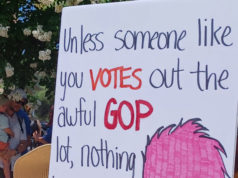Whether you vote red, blue, or green, a ballot access petition drive coming down to the wire in the next week sheds an interesting light on Texas politics.
The Green Party of Texas, which managed to get on the statewide ballot in 2000 and 2002, actually received some financial help in the last few weeks that has allowed it to hire paid workers to gather signatures on a petition that could put them on the ballot again this year. Interestingly enough, state coordinator Kat Swift (kool name Kat!) said they are getting some of their strongest response in North Texas.
“People are just so upset with the system the way it is, especially with things like the State Board of Education, that they’ve been highly responsive,” she said. The party has to gather 44,000 valid signatures on its petitions by next Monday, May 24, to get its 18 candidates on the ballot this fall. Just in the last week or so, Swift said, they’ve gathered almost half of what they need. (If you’re interested, go to ballotaccess.txgreens.org.)
Before the party can get ballot access, though, Swift said, they need access to places where folks gather — and in Texas, they aren’t allowed to collect signatures in a lot of public places. “We’ve been thrown out of public schools, public colleges,” she said. “You mostly have to find stores willing to let you [gather signatures] in their parking lots.”
According to the Greens, Texas has one of the country’s most restrictive ballot-access policies. If your party didn’t get 5 percent of the vote in the last statewide election, you have to gather signatures to get on the ballot. And you have only 75 days in which to do it.
The toughest problem, Swift said, is the “primary screen-out” — the provision disqualifying any voter who cast a ballot in a party primary from signing a ballot-access petition for another party. “That’s the big one,” she said. “People who would be politically inclined” — and therefore inclined to care about such a petition — “go vote.”
Texas is the only state that still has that requirement. In every other state, according to the Greens, it has been declared unconstitutional.
Swift said that, since the 2000 election, it’s been even tougher for Green Party volunteers to gather signatures. Some people blamed the Greens for shaving enough votes off Al Gore’s popular-vote lead to allow George W. Bush to win the presidential election on electoral votes. After that, she said, volunteers began getting “verbally assaulted on the street.”
In Texas in past years, the Greens have elected a few people in nonpartisan races. Their candidates have won statehouse elections in other states — including Arkansas! Probably their greatest success has been in Europe, where the party has been part of coalition governments in several countries and a force for environmental progress – not surprisingly, one of the main tenets of the general Green philosophy, along with social justice, grassroots democracy, and nonviolence.
Getting on the ballot, clearly, wouldn’t ensure the party would win anything in the fall. And even if a few Greens got elected to, say, the legislature, they’d still be a fur piece, as we say in Texas, from successfully changing ballot-access laws.
But think of all the fun we could have if that happened — a Republic of Texas party, maybe. A Tea Party Party. It’s not like the two established parties have done such a bang-up job of leading this state thus far. Maybe “the more, the merrier” is a dangerous idea in politics, but heck, we’ve been trying the other way for a long time, and so far it’s gotten us … the State Board of Education and Rick Perry.











